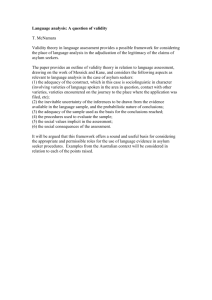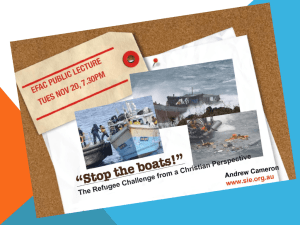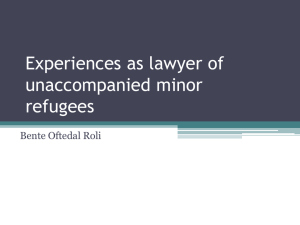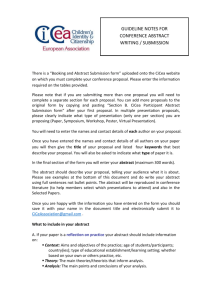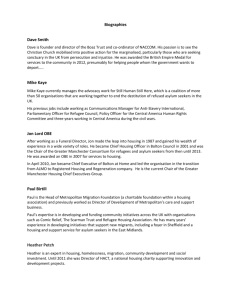Brochure EMA English
advertisement
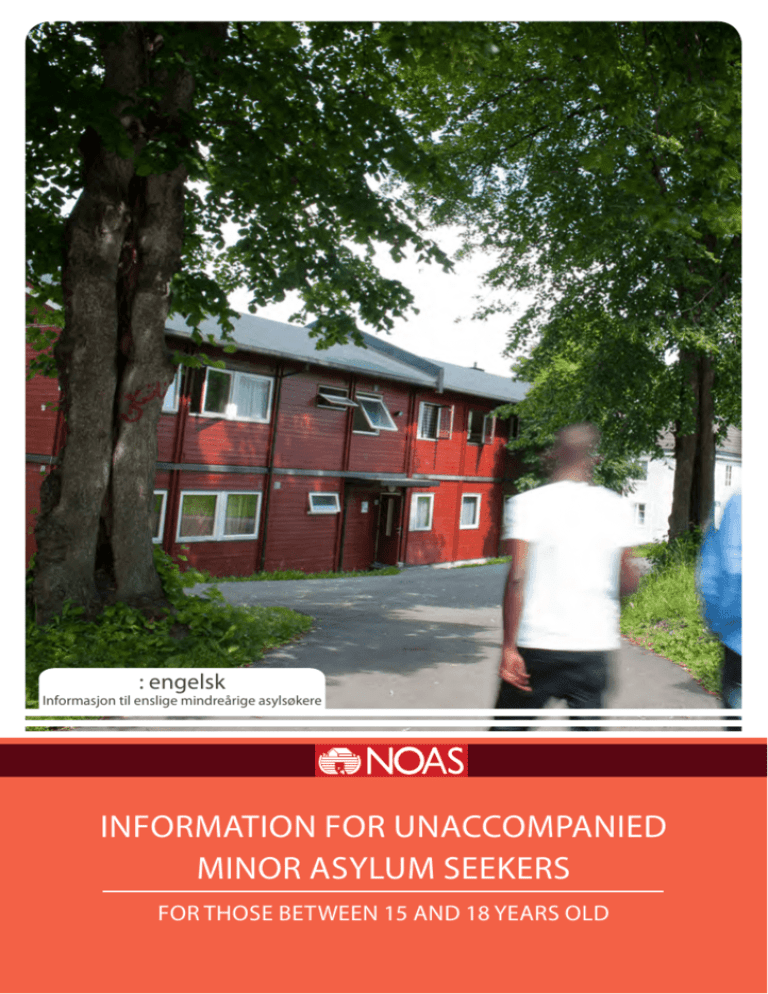
: engelsk Informasjon til enslige mindreårige asylsøkere INFORMATION FOR UNACCOMPANIED MINOR ASYLUM SEEKERS FOR THOSE BETWEEN 15 AND 18 YEARS OLD NOAS 2011 02 Are you under 18 years old? Did you come to Norway to seek asylum, which is to say protection, without your parents or other care persons? If so, then you are what we refer to as an unaccompanied minor asylum seeker. This brochure provides you with information about what happens when you seek asylum in Norway and about your rights and obligations as an unaccompanied minor asylum seeker. ABOUT YOUR FAMILY IN YOUR HOMELAND: If UDI does not know where your family is, they can search for them. It is important that you tell them about your family. It is important that you tell UDI about your family and where they are. UDI can search for your family. NOAS 2011 03 1. WHO HAS THE RIGHT TO ASYLUM? • You have the right to asylum if you are in danger of being killed, tortured or exposed to other types of serious assault if you return to your homeland. • If the authorities in your homeland can protect you, or if there are secure areas in which you can stay in your homeland, you will normally not have the right to asylum in Norway. • The requirements for receiving protection in Norway for unaccompanied minor asylum seekers are often somewhat lower than those which apply for adults. • The question of who has the right to protection is determined by international agreements with which Norway is obligated to comply. 2. WHO CAN BE GRANTED A RESIDENCE PERMIT BASED ON HUMANITARIAN GROUNDS? • If you do not have the right to protection, the authorities will consider whether you fulfil the requirements for a residence permit based on strong humanitarian grounds or a special connection to Norway. 3. WHO IS GRANTED A LIMITED RESIDENCE PERMIT? • If the only reason you will be allowed to remain in Norway is the fact that UDI does not know whether you will receive adequate care if you return home, you can be granted a limited residence permit. This applies to you if you are over 16 years old when UDI processes your application. • The limited residence permit is only valid until your 18th birthday. • The limited residence permit cannot be renewed and it does not give your family the right to come to Norway. 4. WHICH COUNTRY SHALL PROCESS YOUR APPLICATION FOR ASYLUM? • Not all persons who apply for protection in Norway get their application processed in Norway. The Dublin Regulation is an agreement of cooperation between European countries that means that your application can be processed in only one of the participating countries. • If you applied for asylum in another European country before you came to Norway, or if your parents or other persons having parental responsibility for you are in that country, the Norwegian authorities can send you to that country so that your application can be processed there. • Norwegian authorities can determine whether you have applied for asylum in another country by such means as checking your fingerprints. NOAS 2011 04 • If the Norwegian authorities decide to send you to another European country, you have the right to appeal their decision and your lawyer will help you. • If you have applied for asylum in another European country, you can talk about this during your conversation with the NOAS so that you can get more information. 5. WHO PROCESSES YOUR ASYLUM APPLICATION IN NORWAY? The Norwegian Directorate of Immigration (UDI) is a part of the Norwegian government. They interview you and determine whether you shall be granted a residence permit or not. UDI gives careful consideration to each application and treats every application individually. 6. WHAT HAPPENS WHEN YOU APPLY FOR PROTECTION? You register yourself as an asylum seeker with the Police • The police take a photograph of you and fingerprint you. They ask you questions about such matters as who you are and how you came to Norway. • If you have a passport or other documents telling who you are, it is important that you submit these while you are being registered. NOAS 2011 05 You move to a reception centre • After registration you will be driven to a reception centre for unaccompanied minor asylum seekers, where you will stay during the initial period. • Later you will move to another reception centre. • If you are under 16 years old, you have the right and obligation to attend school if it is likely that you will stay in Norway for more than 3 months. If you are between 16 and 19 years old, you might be able to attend school, but you are not obligated to do so. • DIt is important that you speak with the staff members at the reception centre if there is something you think is difficult. They will listen to what you say and help you. The staff members at the reception centre are responsible for your daily care. You will be tested for tuberculosis • During your first few days at the reception centre, you will be tested for the disease tuberculosis. Everyone must do this. If you have tuberculosis, you will receive treatment. • If you have a serious health problem that requires treatment, you should tell the health office about this. NOAS 2011 06 You will receive information and guidance from NOAS • NOAS (the Norwegian Organisation for Asylum Seekers) will show you an informational film about the asylum process in a language you understand well. • After you have seen the film, an employee from NOAS will talk with you. The conversation will be in a language you understand well. You will receive information about what the process of applying for asylum involves and about your rights and obligations. This conversation will prepare you for your asylum interview. It is important that you use this conversation to ask all the questions you have about applying for protection. • NOAS is a non-governmental human-rights organisation that is working for the rights of asylum seekers in Norway. • The employees of NOAS are bound by a confidentiality agreement. This means that nothing you tell NOAS will be told to UDI, the Police or anyone else. Therefore you do not need to be afraid to give them a detailed explanation about why you need protection. You will be appointed a provisional guardian • Your provisional guardian is an adult who will make sure that your rights are being protected. Your provisional guardian can make decisions for you that it would have been natural for your parents to make if they were together with you. • As long as you are here without your parents or other care persons, you have the right to a provisional guardian until your 18th birthday. • Your provisional guardian does not work for UDI. • Your provisional guardian will attend your asylum interview with UDI. • If you move to a new reception centre, you will be appointed a new provisional guardian. You are appointed a lawyer • A lawyer is a person who understands Norwegian laws well and who helps you with your asylum application. • Everyone who is obviously under 18 years old receives free legal assistance prior to their asylum interview with UDI. Others will be appointed a lawyer after the age examination or the asylum interview. You will be interviewed by UDI • Your asylum interview is your most important opportunity to explain to UDI why you are seeking protection and to tell them what you fear will happen if you return to your homeland. You should give them a detailed and very specific explanation of this. 07 NOAS 2011 NOAS 2011 08 • During your interview, you should also tell them who you are, tell them about your family and your trip to Norway. • During your interview, you, an interviewer from UDI, your provisional guardian and an interpreter will be present. • The interpreter will do nothing besides translate what you and the interviewer are saying to each other and is not allowed to tell others what she or he has seen or heard during your interview. Age examination • In Norway, your age is important when you are seeking protection. Applicants under 18 years old are considered as children and they therefore have more extensive rights than adults. • As children who are seeking protection have more extensive rights than adults, sometimes certain adults claim to be under 18 years old. Some of the people seeking asylum are unsure about their exact age. UDI will therefore ask nearly everyone who says they are between 15 and 18 years old if it is OK to do an examination of their age. • The age examination consists of medical examinations that show approximately how old you are. You will receive more information about what these examinations involve. • UDI considers whether there are other things that can help determine your age, such as identity cards, certificates and information from other countries. It is important that you make an effort to help clear up any questions concerning both your age and your identity. • The age examination is voluntary. If you do not wish to be examined, it is likely that you will be assessed as an adult. This can be significant for your application. • If you intentionally provide a false age, and UDI does not consider you to have need for protection in Norway, you can be deported. Deportation can result in your not being allowed to return to Norway and various other European countries in the future. • If UDI determines that you are over 18 years old, you will not be appointed a provisional guardian or lawyer. You will be appointed a lawyer if your application is denied. NOAS 2011 09 YOU WILL RECEIVE AN ANSWER FROM UDI: Residence permit or denial Your lawyer will tell you whether you will be allowed to stay in Norway or not. If you are granted a residence permit, you will be sent to live in a specific municipality • You will receive more information about this from the staff members at the reception centre. If you are granted a limited residence permit, you may be moved to another reception centre. • You can submit an appeal about this residence permit. Your lawyer will help you with this. • You will receive more information about this from the staff members at the reception centre. If your application is denied, you can appeal • As a general rule, you may remain in Norway while awaiting an answer to your appeal. • Your lawyer will help you to write an appeal letter so that the Norwegian authorities can consider your application for asylum one more time. If your appeal is also denied, you must return to your homeland • You can get help with your return trip from the International Organization for Migration (IOM). The IOM can cover your travel expenses and help you to obtain travel ocuments. • You will receive more information about your return trip from the staff members at the reception centre. NOAS 2011 10 IF YOU WISH TO RETURN TO YOUR HOMELAND, YOU CAN GET HELP WITH THIS PROCESS. • You can also get help to return home before you have received an answer from UDI, while you are waiting for your appeal to be processed, or after you have received a denial of your application for asylum. • Your provisional guardian must also agree with this decision. • It is the IOM that can help you with your return trip. The IOM can cover travel expenses and help you to obtain travel documents. • It may be possible for you to receive some money if you return home voluntarily with the help of the IOM. The Norwegian authorities have reintegration programmes for certain countries. If there is such a programme in your homeland, you may get financial support when you travel home. • You can discuss this matter and get more information concerning returning home from the staff members at the reception centre. Important tips for the asylum interview • Explain thoroughly and give lots of details about why you had to leave your homeland and what you have to fear if you return home. NOAS 2011 11 • Focus on what you yourself have experienced and what will happen to you if you must return home. • Give detailed and specific answers to questions about your age. • Be as precise as possible. • If you have children with you, give details about their situation and what they have experienced. • Ask the interviewer to explain anything you do not understand. • If you have any documents that are relevant for your application for asylum, you should bring them with you to your interview. • Tell the truth. If you provide information that is false, it may result in your application being denied. You can also be deported from Norway, which can result in your not being allowed to return to Norway and most of the other European countries in the future. YOUR OBLIGATIONS AND RIGHTS AS AN ASYLUM SEEKER You are obligated to cooperate with determining your identity It is important for the Norwegian authorities to know who you are and how old you are. It is therefore important that you submit documents that can confirm who you are. If you are being persecuted by the authorities in your homeland, the Norwegian authorities will not insist that you contact them in order to obtain identity documents. If the Norwegian authorities have doubts concerning your identity, you risk: • not being believed • reducing your chances of being granted a residence permit • losing rights you would otherwise have • being granted a limited residence permit You are obligated to provide correct information As an asylum seeker, you must explain why you are seeking protection. You must therefore do your best to provide the required information and to cooperate fully. No matter what others may have told you before you applied for asylum (protection), it is important that you explain to the Norwegian authorities the actual reasons for your asylum application. It is a punishable offence to provide false information. It can also result in deportation. NOAS 2011 12 You may have the right to work while you are seeking asylum If you are able to document your identity, normally with your passport, you may have the right to work while your application is being processed. Your provisional guardian must agree with this decision and your work must not interfere with your schooling. You have the right to medical treatment You have the right to necessary medical treatment while you are awaiting an answer concerning your asylum application. Everyone who is over 16 years old in Norway must usually pay a share of the cost themselves. If you need the help of a psychologist, you can have this expense covered by UDI. Contact the staff members at the reception centre for more information about this. You should inform UDI and your provisional guardian of any major health problems you have. You have the opportunity to withdraw your asylum application You can withdraw your asylum application at any time. You will then have the option of submitting an application to the IOM for help concerning your trip home. Do you wish to get help with searching for your parents or other family members? If you wish to get help with contacting or finding your parents or other family members, you can contact the staff members at the reception centre. The Red Cross can also help you to find your family. CONFIDENTIALITY PLEDGE The Police, UDI and UNE all are subject to a pledge of confidentiality. This means that they cannot share information about your asylum application with the authorities in your homeland. They are also not allowed to repeat what you have told them to other persons who are not working with your asylum application. It is a punishable offence to breach a pledge of confidentiality. Therefore you do not need to be afraid to provide a detailed explanation about why you need protection. The interpreter, lawyer, health personnel and NOAS are also subject to a pledge of confidentiality. This means that none of what you tell them will be told to others, not even to UDI, UNE or the Police This brochure was made by the Norwegian Organisation for Asylum Seekers (NOAS). NOAS is a non-governmental human-rights organisation that provides information and legal assistance to asylum seekers. 13 NOAS 2011 NOAS 2011 14 ADDRESSES THE POLICE IMMIGRATION UNIT (POLITIETS UTLENDINGSENHET) The police register newly arrived asylum seekers. The police also repatriate asylum seekers who do not leave Norway voluntarily once they have had their asylum applications rejected. Postal address: Postboks 8102 Dep., NO-0032 Oslo, Norway Visiting address: Christian Krohgs gate 32, 0186 Oslo Tel.: +47 22 34 24 00, Fax: +47 22 34 24 80 E-mail: pu@politiet.no THE NORWEGIAN IMMIGRATION DIRECTORATE (UDI) is a government institution whose duties include processing asylum applications, visas and national citizenship matters, and reuniting families. The UDI is also responsible for reception centres. Postal address: Postboks 8108 Dep., NO-0032 Oslo, Norway Visiting address: Hausmannsgt. 21, 0182 Oslo Tel.: +47 23 35 15 00, Fax: +47 23 35 15 01 Website: www.udi.no, E-mail: ots@udi.no INTERNATIONAL ORGANIZATION FOR MIGRATION (IOM) Information on assisted voluntary return Postal address: Postboks 8927 Youngstorget, NO-0028 Oslo, Norway Visiting address: Storgata 10a, 2nd floor, 0155 Oslo Tel.: +47 23 10 53 20, Fax: +47 23 10 53 21 E-mail: osloreturn@iom.int Opening hours: Weekdays: 10:00 – 15:00, Weekends: Closed NOAS 2011 15 THE NORWEGIAN IMMIGRATION APPEALS BOARD (UTLENDINGSNEMNDA – UNE) is a quasi-judicial administration body that processes appeals relating to rejections made by the UDI. Postal address: Postboks 8165 Dep., NO-0034 Oslo, Norway Visiting address: Stenersgt. 1B/C, 0050 Oslo Tel.: +47 21 08 50 00, Fax: +47 21 08 50 01 Website: www.une.no, E-mail: postmottak@une.no THE NORWEGIAN RED CROSS (NORGES RØDE KORS) tracing services, assist in re-establishing contact between family members who have been separated due to war, conflict or catastrophes. The Red Cross does not provide information on you to the UDI or others. The service is free. Postal address: Postboks 1 Grønland, NO-0133 Oslo, Norway Visiting address: Hausmannsgt. 7, 0186 Oslo Tel.: +47 22 05 40 00 Website: www.rodekors.no, E-mail: tracing@redcross.no NOAS is a non-governmental human rights organisation that provides information and legal assistance for asylum seekers. The brochure contains important information for asylum seekers applying for protection in Norway. Norwegian Organisation for Asylum Seekers (NOAS) Visiting address: Torggata 22, 0183 Oslo, Norway Postal address: P.O. Box 8893 Youngstorget, NO-0028 Oslo, Norway Tel.: +47 22 36 56 60, Fax: +47 22 36 56 61 Website: www.noas.org, E-mail: noas@noas.org
